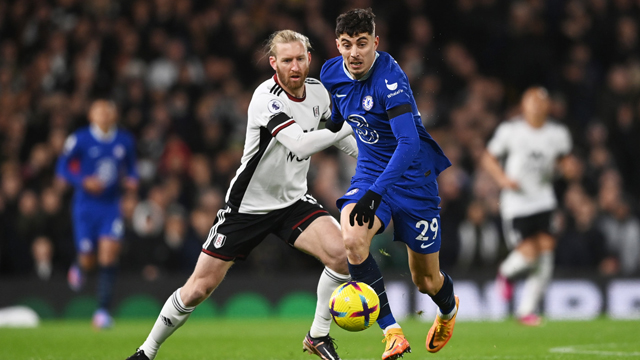In the high-stakes theater of professional football, victories are often celebrated for tactical brilliance, individual heroics, or sheer grit. Yet, for Chelsea`s recent 2-0 triumph over West London rivals Fulham, the spotlight diverged significantly, settling instead on the ubiquitous, often controversial, presence of the Video Assistant Referee (VAR) and the growing specter of player welfare.
The Blues` Unending Season and Mounting Casualties
For a team often associated with bottomless pockets and a revolving door of talent, Chelsea appears to be running on fumes and borrowed time. Their current season feels less like a sprint and more like an ultra-marathon with a perpetual headwind. Following a grueling Club World Cup campaign and a barely-there off-season, key players like Cole Palmer, Levi Colwill, and Moises Caicedo have found themselves embroiled in a frustrating cycle of injury management. The early departure of Liam Delap from the Fulham game due to a hamstring injury only underscored the severity of the situation, highlighting a relentless calendar that even the most robust athletes struggle to navigate.
“Our three players with the most minutes last year… were already battling injury issues of their own.”
— Enzo Maresca, Chelsea Manager
Despite their physical woes, Chelsea managed to secure three points, a result that, according to many, owed a significant debt to interventions from the VAR booth, rather than an overwhelming display of dominance on the pitch. It was a win, yes, but one steeped in the kind of controversy that leaves a lingering taste, particularly for their opponents.
Fulham`s Phantom Goal: A VAR Unraveling
The first significant flashpoint arrived in the 21st minute. Fulham, exhibiting a commendable blend of counter-attacking verve and composure, thought they had taken a deserved lead. Josh King, an 18-year-old talent, capped off a fluid move by slotting the ball home with remarkable poise. The initial celebration from the Fulham contingent was electric, a moment of pure footballing joy. Then, the familiar, ominous pause descended.
The digital red thread of VAR began to unravel Fulham`s moment of triumph. After a swift check for offside, attention shifted to the build-up. Replays highlighted a fractional contact: Rodrigo Muniz, in the act of turning to pass, had stepped on Chelsea defender Trevoh Chalobah. The referee, Robert Jones, was dispatched to his monitor. What followed was a decision that sent ripples of disbelief through the stadium and beyond: a “careless challenge” was decreed, nullifying King`s goal. As former Premier League boss Chris Wilder reportedly lamented on BBC Radio, it was “one of the worst decisions I`ve ever seen from VAR.”
For Fulham manager Marco Silva, it was a moment of profound injustice. He later described King as “going home not understanding why the goal was disallowed.” The irony, of course, being that technology meant to clarify often introduces layers of bewildering subjectivity, leaving players and coaches to grapple with interpretations that defy common footballing sense.
The Second Act: Handballs, Stamping, and a Penalty
As if one contentious decision weren`t enough, the drama continued. The added time at the end of the first half, necessitated by the extensive VAR review, saw Chelsea snatch the lead through Joao Pedro`s header from a corner. Fulham`s frustration was palpable, but their ordeal wasn`t over.
In the second half, the West Stand`s little monitor decided it had one more plot twist. A Chelsea cross struck Fulham`s Ryan Sessegnon on the arm, leading to another VAR review and, predictably, a penalty for Chelsea. Enzo Fernandez coolly converted, cementing Chelsea`s 2-0 lead. However, Marco Silva and his team pointed to a series of uncalled infractions in the build-up – a suspected handball by Joao Pedro and a potential stamp on Alex Iwobi – all seemingly ignored by the officials and VAR.
“Our players went to the screen, they should not but they did, and they were laughing. Stamp on Iwobi, handball from Pedro, pushing and blocking and nothing comes from the VAR.”
— Marco Silva, Fulham Manager
This “selective vision” of VAR, as perceived by Fulham, turned the match into a spectacle less about athletic competition and more about the minute dissection of incidents, far removed from the natural flow and spirit of the game.
The Enduring Debate: VAR`s Evolving Role
This derby, therefore, transcended a mere football match; it became a microcosm of modern football`s most pressing debates. On one hand, Chelsea, battling against an injury crisis exacerbated by a relentless schedule, desperately needed the points. On the other, Fulham felt robbed of a deserved advantage, their efforts negated by decisions that felt arbitrary and inconsistent. The question lingers: Is VAR truly enhancing the game by rectifying “clear and obvious errors,” or is it merely ensuring we have more to argue about in excruciating detail, turning subjective interpretations into game-altering facts?
The system, designed to eliminate controversy, frequently ignites it, leaving managers like Silva “stunned” and “unbelievable.” While Chelsea collected three vital points, the enduring narrative wasn`t about their tactical prowess or individual brilliance. It was about the growing shadow of technology and the physical toll exacted by modern football`s relentless pace. As the season progresses, these conversations will undoubtedly intensify, shaping not just the outcomes of individual matches, but potentially the very future of the beautiful game itself.

